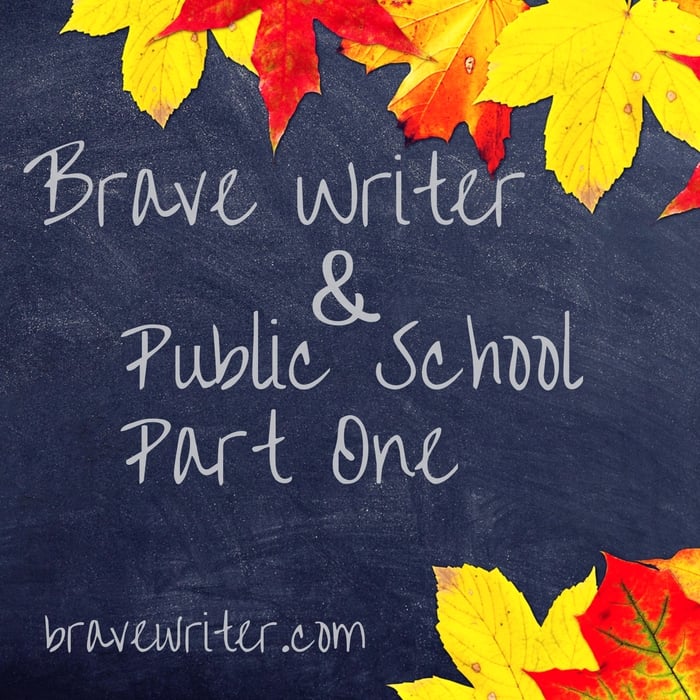Brave Writer, afterschooling and public schooled kids (Part One)

I’ve had several emails asking about how Brave Writer fits with public schooling or if it can be used for afterschooling. The answer is a resounding yes!
I have two experiences to share that might shed a little light on how writing in public school is experienced and perceived.
My roommate friend from college called me to ask for writing help and advice for her then 9 year old daughter. Apparently this natural writer had already lost her enthusiasm for telling stories, doodling, and writing. Her teacher had assigned the class a daily journaling practice. Jennifer’s writing had gone from delightful retellings of the little events in her life to carefully crafted, correctly punctuated two or three sentences that recounted nothing more important than what she had eaten for breakfast.
Upon further inquiry by me, I discovered that this teacher was red-inking these daily journal entries. Each one was graded for grammar, spelling, punctuation and neatness (penmanship). At age nine, little Jennifer had already figured out that she was “safest” if she kept her entries short, avoided any words she didn’t know how to spell and limited her sentences to only a few words at a time.
Cyndy called to ask me: “What has happened to my daughter’s love of writing and her bright imagination?” Cyndy wondered how to rekindle Jennifer’s enthusiasm for language in written form now that school had snuffed it out. I had to wonder:
What good is proper punctuation, spelling and tidy handwriting if the contents were tedious to read?
Becky, a homeschooling mother getting her feet wet with Brave Writer, has a different perception of school and sent an email to ask me this question:
Julie,
Why is it that public schools seem to teach writing so much better (or at least more easily) than homeschoolers? What are we doing wrong? What are they doing right? I hear from you and from lots of other homeschoolers to not worry so much and that things then to work out without so much worry. I want my child to WRITE and the public school students seem to do it so easily. What should I change? Should I change?
We are beginning on our Writer’s Jungle journey and are enjoying Freewrites and Teatimes and Copywork/Dictation with the Arrow. My son is nine years old.
I thought maybe you might be able to answer this question in you blog at sometime in the future.
Thanks,
Becky in WA
It is interesting that her son is also nine years old. I emailed her back with a few questions and Becky sent a second email:
I suppose some of the reason that I feel the public schools are doing a better job at teaching writing is based on the quantity of work that the children produce and the ease with which they control a pencil (neat handwriting). Public school seems to do more writing than homeschoolers do and it isn’t a big deal to the students. Sometimes it seems like pulling teeth to get two sentences out of my son.
For example: Public school: write in your journal today; answer these questions (in writing) about the film we just watched, do written corrections in your grammar book of these sentences, write a sentence with each of your spelling words, do this type of book report, etc. My son acts like he is dying having to write anything, and I worry that I have done something wrong by not pushing or requiring more of him. Admittedly, he loves to write on his own (horrible spelling and few capitals or periods) and really doesn’t mind the freewrite/copywork things we are doing with writer’s jungle (sic). But we still do a lot of work orally and his handwriting is awful.
I wonder if my son has more than the usual problems with writing (such as dysgraphia) or if he is fine. But there seem to be a lot of homeschooled boys whose mothers can’t get them to write. What are we doing wrong?
Becky
From the inside, school writing feels stifling, contrived and sometimes, overwhelming, particularly to kids who struggle to write (and there are plenty of those types of kids in public school). From the outside, that reassuring stack of completed writing assignments with happy faces, stickers and the requisite red ink creates the impression of cooperative, effective writing instruction. Not so fast Charley.
Let’s take a closer look at the differences between school in a building and school at home. First, classrooms hold some 20-30 children with one teacher. That teacher doesn’t have time to hold rich conversations with each child about his or her reactions to a film, book, play or art project. The teacher can’t sit side by side with each kid discussing writing conventions, accommodating learning styles, giving unlimited time to complete a project, tailoring an assignment to fit the individual strengths and weaknesses of the child. She might want to. And many of the good ones figure out how to do as much of that as they can within the confines of school. Still, logistically speaking, school is about managing a large group and moving them through pre-designed steps that must be covered by year’s end.
The truth is, what counts in school is performance on year-end district or statewide tests. Those tests measure the measurable. They aren’t looking at how rich the imagination is, or how sophisticated the vocabulary, or how intensely that student mastered a specific area of interest (like art from the Renaissance or why an owl’s head can turn 360 degrees or how Pokemon cards are organized). Paragraphs organized according to formula (for easy grading), spelling, grammar and punctuation get top billing. Training kids to tolerate a lot of writing is top priority.
In a controlled environment where mothers are not present, students learn how to manage their anxiety around writing. Some shut down the creativity (like Jennifer), some are funneled into special needs groups (even kids who don’t have special needs but who just need a bit more time to mature), some begin to hate school. (Of course there are some kids who enjoy school and writing and don’t have these reactions too. Those kids would do well in any learning environment and make up a smaller percentage of the whole.)
Public school does what we can’t do at home: It sets a normative daily practice that kids feel compelled to obey despite their abilities, interest level or needs. They are trained early on that success in that environment requires compliance, coping, and copying (the models, the methods and the manner of learning).
Home education is less coercive by nature. Phone calls, dental appointments and holiday preparations interrupt “school,” mothers are warm and cuddly (usually) and responsive to complaints. Parents can know that a child is learning without a worksheet, they can enjoy and savor a child’s latest in-depth exploration of a topic because there is time enough, space enough, caring enough for those conversations to occur. Writing is a part of a whole life, not a requirement to finish so recess can begin, so the report card will be good, so the teacher will be satisfied.
In short, writing at home has an entirely different character and quality than it does in school.
It develops more the way talking developed in your children. A nine year old boy may really feel that handwriting is torture (just so you know, lots of nine year olds in school feel that way too however they have no options but to do what they hate anyway). As parents at home, we have the chance to do it differently.
As I told Cyndy, writing has to become a means of communication that the child values in order for it to ever be more than the execution of duty on behalf of someone else’s agenda. I sent Cyndy some of the exercises we use in Kidswrite Basic as well as The Writer’s Jungle (I’ll write more about these in Part Two). We talked about how to get the joy and life back into her daughter’s experiences. I suggested that Cyndy talk to the teacher and ask her to let journal entries be free of corrections so that kids could take writing risks while they are developing. I suggested books that she could recommend to the teacher about how writing develops in children.
As home educators, we can do all of this and more. We can give space for freedom in writing (without corrections), we can take time for our kids’ hands to develop so that they don’t hate the physical act of writing which then sets the pattern of hating written communication. We can celebrate the insight despite the spelling. There’s no crime in having bad spelling at age 9. Think of it this way. When your toddler misspeaks, you don’t worry that other kids from daycare are better “talkers.” You chuckle when he says “mazazine” and means “magazine” because you know over time, he’ll learn to say it correctly. Same thing is true when he writes “becuz.” Jot it down in the baby book as evidence of a “cute stage” he’s in.
The point is this: homeschool and public school are profoundly different in their outlook and methods of education.
Don’t expect home to mirror school and vice versa. However, given the limitations and strengths of each, there are ways to preserve and cultivate a love for writing. Tomorrow’s entry will discuss how to create a space at home (either for afterschooling or homeschooling) that releases the writer within your child.


















Thanks for reminding us that Homeschool and public school are two different creatures and we should treat them as such.
Becky
All-
We left public school when my daughter was at the end of 2nd grade. She is now 11, MY friends who still send their children to school sometimes email me with tidbits like the one below to remind me just HOW different public school is from our home. This latest email made me very grateful to be homeschooling, where books are a joy, a reward in themselves. I am also grateful for Julie Bogart for treating children and parents with respect and common sense.
Anne
This letter came home from X Public Schools with first grader K. today, unsigned but from the district. Letter was attached to a four page chart:
“Dear Parents:
Attached is a wide variety of activities to “Investigate A Book.” They
are arranged in the NEW version of Bloom’s Taxonomy of Levels of
Intellectual Behavior important in learning. Choose one to complete
each week that fits the book you’re reading, and move up the levels for
challenging tasks.”